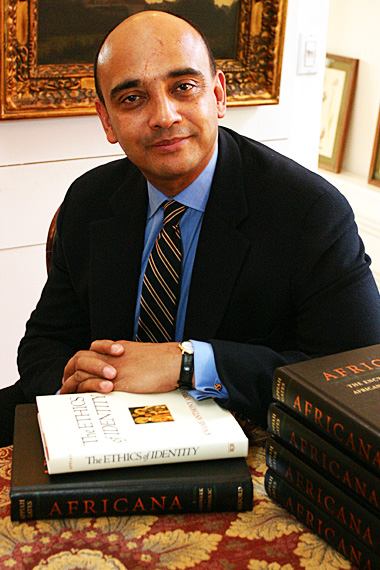Award-winning philosopher and foreign policy writer Kwame Anthony Appiah examines questions of honor and societal obligation Tuesday, Feb. 17 in a Lawrence University convocation.

A professor of philosophy and law at New York University, Appiah presents “A Decent Respect: Honor and Citizenship at Home and Abroad” at 11:10 a.m. in the Lawrence Memorial Chapel. He also will also conduct a question-and-answer session in the Warch Campus Center cinema at 2:30 p.m. Both events are free and open to the public.
Named one of the “Top 100 Global Thinkers” in 2010 by Foreign Policy magazine, the London-born Appiah challenges audiences to consider the big questions: what does it mean to be a citizen of the world?; what is a person’s obligations to others?; should larger obligations always trump concerns for family, friends and local communities?
Cambridge University educated — he earned both his bachelor’s degree and Ph.D. there — Appiah has written extensively on a wide range of topics, from foundations of probabilistic semantics to African and African-American literary and cultural studies.
Included on Forbes magazine’s 2009 list of the world’s “seven most powerful thinkers,” Appiah was honored with the Anisfield-Wolf Book Award for his 1992 book “In My Father’s House.” Charles Johnson of The New York Times declared it “one of the handful of theoretical works on race that will help preserve our humanity.”
His 2010 book, “The Honor Code: How Moral Revolutions Happen,” focuses on how human morality is continuously shaped and altered around definitions and traditions of honor.
Appiah has been recognized with dozens of honors and awards, among them the 2011 National Humanities Medal “for seeking eternal truths in the contemporary world,” election to the American Academy of Arts and Sciences and the American Philosophical Society and induction into the American Academy of Arts and Letters.
About Lawrence University
Founded in 1847, Lawrence University uniquely integrates a college of liberal arts and sciences with a nationally recognized conservatory of music, both devoted exclusively to undergraduate education. It was selected for inclusion in the Fiske Guide to Colleges 2015 and the book “Colleges That Change Lives: 40 Schools That Will Change the Way You Think About College.” Engaged learning, the development of multiple interests and community outreach are central to the Lawrence experience. Lawrence draws its 1,500 students from nearly every state and more than 50 countries.